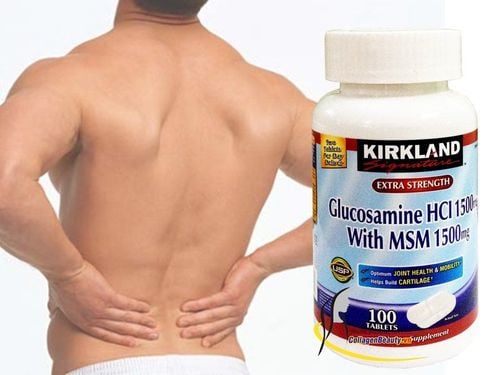This is an automatically translated article.
Menison 16mg drug is often used to treat diseases related to inflammation, allergies, and effective immunosuppression. Read the article to better understand what are the uses of Menison 16mg? Side effects as well as notes when using to ensure safety for your health.
1. What is Menison?
Menison 16mg drug is manufactured by Pymepharco Joint Stock Company, with the main ingredient being methylprednisolone. This drug is indicated for diseases requiring glucocorticoid activity such as endocrine disorders, rheumatic disorders, collagen diseases, arteritis, dermatological diseases, allergies, respiratory diseases.
Menison medicine contains the active ingredient Methylprednisolone. Methylprednisolone is a glucocorticoid with anti-allergic, anti-inflammatory and immunosuppressive effects.
The component is metabolized by the liver and excreted mainly in the urine.
Pharmacodynamics:
Methylprednisolone is a synthetic glucocorticoid, 6-alpha methyl derivative of prednisolone. The drug is mainly used for anti-inflammatory or immunosuppressive effects. The drug is usually used in an esterified or non-esterified form to treat conditions where corticosteroids are indicated.
Due to prednisolone methylation, methylprednisolone has only minimal mineralocorticoid activity (minor salt metabolism) and is not suitable for the treatment of adrenal insufficiency alone. If methylprednisolone is used in this case, additional mineralocorticoids must be used.
Methylprednisolone has anti-inflammatory, immunosuppressive and anti-proliferative effects. The anti-inflammatory effect is due to the fact that methylprednisolone reduces the production, release and activity of anti-inflammatory mediators (such as histamine, prostaglandins, leucotrienes, ..) thereby reducing the initial manifestations of the inflammatory process.
Methylprednisolone inhibits incoming leukocytes from adhering to the damaged vessel wall and migrating to the injured area, reducing the permeability in that area, thus making less white blood cells go to the injured area. This effect reduces extravasation, swelling, edema, pain.
Immunosuppressive properties reduce response to slow and immediate reactions (types III and IV). This is due to inhibition of the toxic effect of the antigen-antibody complex that causes allergic vasculitis in the skin. By inhibiting the effects of lymphokines, target cells, and macrophages, corticosteroids attenuated allergic contact dermatitis reactions. In addition, corticosteroids inhibit T lymphocytes and sensitive macrophages from reaching target cells. Anti-proliferative effects reduce the hyperplasia characteristic of psoriasis.
Pharmacokinetics:
Bioavailability is about 80%. Plasma concentrations reach a maximum 1 - 2 hours after dosing.
The duration of biological action is about 1 - 1/2 days, which can be considered short-acting. Methylprednisolone is metabolised in the liver, in the same way as hydrocortisone, and the metabolites are excreted in the urine. The half-life is approximately 3 hours.
2. What are the effects of Menison 16mg?
Menison 16mg drug is indicated for use in diseases requiring glucocorticoid activity such as:
Endocrine disorders: Primary and secondary adrenal insufficiency, congenital adrenal hyperplasia. Rheumatic disorders: Rheumatoid arthritis, ankylosing spondylitis, chronic arthritis in children. Collagen disease, arteritis: Systemic lupus erythematosus, systemic dermatomyositis, acute rheumatic heart disease, giant cell arteritis, rheumatic musculoskeletal pain. Dermatological diseases: Pemphigus common form. Allergies: Severe seasonal and year-round allergic rhinitis, drug hypersensitivity reactions, serum sickness, allergic contact dermatitis, bronchial asthma. Ophthalmic diseases: Anterior uveitis (iritis, blepharitis), posterior uveitis, optic neuritis. Respiratory disease: Pulmonary sarcoidosis, acute or disseminated tuberculosis (for appropriate anti-tuberculosis chemotherapy), aspiration lung injury. Hematologic disorders: Idiopathic thrombocytopenic purpura and hemolytic anemia (autoimmune). Tumor disease: Leukemia (acute and lymphatic) and malignant lymphoma. Gastrointestinal diseases: Ulcerative colitis and Crohn's disease. Other: Meningoencephalitis (with appropriate anti-tuberculosis chemotherapy), organ transplantation. 3. Side effects of the drug Menison 16mg Hirsutism; Insomnia; Athritis; Epistaxis ; Glaucoma; Diabetes. Tell your doctor if these symptoms develop while taking Menison.
4. Drug interactions
4.1. What drugs may interact with Menison? Menison may change how other medicines you are taking work or increase the effects of side effects. To avoid drug interactions, it's best to write down a list of all the medications you're taking (including prescription, over-the-counter, herbal and dietary supplements) and show them to your doctor or pharmacist. To ensure safety when taking medicine, do not arbitrarily take the drug, stop or change the dose of the drug without the permission of your doctor.
Drugs that may interact with Menison include Cyclosporin, Phenobarbital, Phenytoin, Rifampin and hypokalemic diuretics.
4.2. Can Menison interact with any foods or beverages? Food, alcohol, and tobacco can interact with certain medications. Consult your doctor about taking your medicine with food, alcohol and tobacco.
5. How to use Menison 16mg effectively How to use:
Menison 16mg for oral use. The recommended starting dose of methylprednisolone depends on the disease to be treated:
Rheumatoid arthritis: Severe 12 - 16 mg/day, moderate 8 - 12 mg/day, mild and children 4 - 8 mg/day. Systemic dermatomyositis: 48mg/day. Systemic lupus erythematosus: 20-100mg/day. Acute Rheumatoid Arthritis: 48mg/day until the erythrocyte sedimentation rate (ESR) is normal for about one week. Allergic diseases, ophthalmic diseases: 12-40mg/day. Asthma: May be up to a single dose of 64 mg every other day, up to a maximum dose of 100 mg. Hematologic disorders and leukemia, malignant lymphoma: 16-100mg/day. Ulcerative colitis: 16-60mg/day. Crohn's disease: Up to 48mg/day in acute phase may be possible. Organ transplantation: Up to 3.6mg/kg/day may be possible. Pulmonary sarcoid disease: 32 - 48mg/day taken every other day. Giant cell arteritis/rheumatic musculoskeletal pain: 64mg/day. Common pemphigus: 80-360mg/day. The average total recommended daily dose may be administered as a single dose or in divided doses (except in alternate-day therapy where twice the minimum effective daily dose is administered and administered every 2 days at 8 o'clock). shining).
Undesirable effects can be minimized by using the lowest effective dose for the shortest time.
The initial inhibitory dose may vary depending on the disease being treated. This dose is maintained until a satisfactory clinical response is obtained, approximately 3-7 days in rheumatic diseases (except acute rheumatic fever), allergic skin diseases or respiratory and ophthalmic diseases. If clinical response is not achieved within 7 days, re-evaluation of the disease is necessary to confirm the initial diagnosis.
As soon as a satisfactory clinical response is achieved, the daily dose should be gradually reduced until the end of treatment in acute diseases (eg, seasonal asthma, exfoliative dermatitis, acute opticitis) or to the minimum effective maintenance dose in chronic diseases (eg, rheumatoid arthritis, systemic lupus erythematosus, bronchial asthma, atopic dermatitis).
In chronic diseases, especially in rheumatoid arthritis, it is important to reduce the dose from the initial dose to the maintenance dose to achieve clinically relevant. The recommended dose reduction is no more than 2 mg over a 7-10 day period. In rheumatoid arthritis, maintenance steroid therapy should be at the lowest possible dose.
In alternate day therapy, double the minimum daily dose of corticosteroids is used and a single dose is administered every 2 days at 8 am. Dose requirements depend on the patient being treated and the patient's response.
Elderly patients: The treatment of elderly patients, particularly if long-term treatment is necessary, should be considered and the serious consequences of the adverse effects of corticosteroids are common in the elderly, especially in the elderly. osteoporosis, diabetes, high blood pressure, susceptibility to infections, and thinning of the skin.
Children: In general, the dosage for children should be based on clinical response and on the discretion of the physician. Treatment should be limited to the minimum dose for the shortest period of time. If possible, you should take a single dose and take it every other day.
Note: The above dosage is for reference only. The specific dose depends on the condition and the progression of the disease. To get the right dose, you need to consult your doctor or healthcare professional.
What to do in case of overdose:
Symptoms of overdose include cushing's syndrome (systemic), osteoporosis (systemic) and muscle weakness (systemic), all of which occur only with use long-term glucocorticoids. When excessively high doses are used for a long time, adrenal hyperplasia and adrenal suppression may occur. In these cases, consideration should be given to making the right decision to discontinue or completely discontinue glucocorticoid therapy. What to do if you miss a dose:
If you miss a dose, take it as soon as possible. However, if it is almost time for your next dose, skip the missed dose and take your next dose at the scheduled time. Note that double the prescribed dose should not be taken.
6. Be careful when using Menison 16mg
Do not arbitrarily use Menison for pregnant and lactating women. You need to talk to your doctor about the benefits and risks of treatment with Menison. If you are taking a live virus vaccine, have a serious infection or are being treated for meningitis,... you need to talk to your doctor so that the drug can be considered. Menison's activities can have a negative impact on these issues. Parents need to closely monitor the process of children taking medicine to minimize the situation of children using less or more than the recommended dose. Some drinks and foods can change how the medicine works. Talk to your doctor about this before taking this medicine. Menison does not affect the ability to drive, operate machinery 7. How to store Menison? You should store at room temperature, away from moisture and light. Do not store in the bathroom or in the freezer. You should keep in mind that each medicine may have different storage methods. Therefore, you should carefully read the storage instructions on the packaging or ask the pharmacist. Keep medicine out of reach of children and pets.Above is information about the uses, dosage and usage of Menison. Patients should carefully read the instructions for use, consult a doctor / pharmacist before use.
Please dial HOTLINE for more information or register for an appointment HERE. Download MyVinmec app to make appointments faster and to manage your bookings easily.













